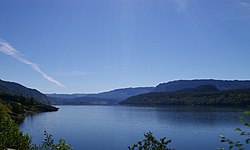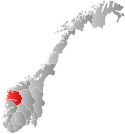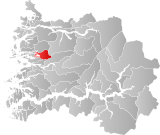Eikefjord is a former municipality in the Sunnfjord district in the old Sogn og Fjordane county, Norway. The 145-square-kilometre (56 sq mi) municipality existed from 1923 until 1964 when it joined Flora Municipality (now part of Kinn Municipality in Vestland county). The administrative center of the former municipality was the village of Eikefjord, where Eikefjord Church is located. The municipality of Eikefjord was located at the end of the Eikefjorden, about 30 kilometres (19 mi) east of the town of Florø. The lake Endestadvatnet was part of the municipality. The municipality encompassed the immediate area around the village of Eikefjord and to the east and south of the village.[2]
Eikefjord Municipality
Eikefjord herad | |
|---|---|
 View of the Eikefjorden | |
 Sogn og Fjordane within Norway | |
 Eikefjord within Sogn og Fjordane | |
| Coordinates: 61°35′04″N 05°27′29″E / 61.58444°N 5.45806°E | |
| Country | Norway |
| County | Sogn og Fjordane |
| District | Sunnfjord |
| Established | 1 Jan 1923 |
| • Preceded by | Kinn Municipality |
| Disestablished | 1 Jan 1964 |
| • Succeeded by | Flora Municipality |
| Administrative centre | Eikefjord |
| Area (upon dissolution) | |
• Total | 145 km2 (56 sq mi) |
| Population (1964) | |
• Total | 919 |
| • Density | 6.3/km2 (16/sq mi) |
| Time zone | UTC+01:00 (CET) |
| • Summer (DST) | UTC+02:00 (CEST) |
| ISO 3166 code | NO-1435[1] |
| Website | Official website |
History
editThe parish of Eikefjord was established as a municipality on 1 January 1923 when the large municipality of Kinn was divided into three: Kinn (population: 2,508) in the west, Bru (population: 1,560) in the centre, and Eikefjord (population: 929) in the east.[3]
During the 1960s, there were many municipal mergers across Norway due to the work of the Schei Committee. On 1 January 1964, Eikefjord Municipality (population: 919) was merged with the town of Florø (population: 2,040), Kinn Municipality (population: 3,567), the parts of Bru Municipality located north of the Førdefjorden (population: 1,155), the Husefest and Breivik areas of Bremanger Municipality (population: 9), and the Steindal area of Vevring Municipality (population: 25) were combined to form the newly created Flora Municipality.[3]
Name
editThe municipality (originally the parish) is named after the old Eikefjord farm (Old Norse: Eikifjǫrðr) since the first Eikefjord Church was built there. The farm was named after the local fjord. The first element comes form the word eik which means "oak". The last element is fjǫrðr which means "fjord" or "firth".[4]
Government
editDuring its existence, this municipality was governed by a municipal council of directly elected representatives. The mayor was indirectly elected by a vote of the municipal council.[5]
Mayors
edit- 1923-1925: Henrik Svarthumle
- 1926-1928: Kristoffer Langedal
- 1929-1934: Abraham Storøy
- 1935-1940: Ludvig Langedal
- 1941-1945: Leiv Vasset
- 1945-1945: Ludvig Langedal
- 1946-1959: Alf Svarthumle
- 1960-1961: Erik Dreyer Hovland
- 1962-1963: Alf Svarthumle
Municipal council
editThe municipal council (Heradsstyre) of Eikefjord was made up of 13 representatives that were elected to four year terms. The party breakdown of the final municipal council was as follows:
| Party name (in Nynorsk) | Number of representatives | |
|---|---|---|
| Labour Party (Arbeidarpartiet) | 5 | |
| Christian Democratic Party (Kristeleg Folkeparti) | 1 | |
| Centre Party (Senterpartiet) | 3 | |
| Liberal Party (Venstre) | 3 | |
| Local List(s) (Lokale lister) | 1 | |
| Total number of members: | 13 | |
| Party name (in Nynorsk) | Number of representatives | |
|---|---|---|
| Labour Party (Arbeidarpartiet) | 5 | |
| Liberal Party (Venstre) | 3 | |
| Joint List(s) of Non-Socialist Parties (Borgarlege Felleslister) | 5 | |
| Total number of members: | 13 | |
| Party name (in Nynorsk) | Number of representatives | |
|---|---|---|
| Labour Party (Arbeidarpartiet) | 5 | |
| Joint list of the Farmers' Party (Bondepartiet) and the Liberal Party (Venstre) | 4 | |
| Joint List(s) of Non-Socialist Parties (Borgarlege Felleslister) | 3 | |
| Total number of members: | 12 | |
| Party name (in Nynorsk) | Number of representatives | |
|---|---|---|
| Labour Party (Arbeidarpartiet) | 4 | |
| Liberal Party (Venstre) | 5 | |
| Joint List(s) of Non-Socialist Parties (Borgarlege Felleslister) | 3 | |
| Total number of members: | 12 | |
| Party name (in Nynorsk) | Number of representatives | |
|---|---|---|
| Local List(s) (Lokale lister) | 12 | |
| Total number of members: | 12 | |
| Party name (in Nynorsk) | Number of representatives | |
|---|---|---|
| Labour Party (Arbeidarpartiet) | 4 | |
| Liberal Party (Venstre) | 5 | |
| Joint List(s) of Non-Socialist Parties (Borgarlege Felleslister) | 3 | |
| Total number of members: | 12 | |
| Note: Due to the German occupation of Norway during World War II, no elections were held for new municipal councils until after the war ended in 1945. | ||
See also
editReferences
edit- ^ Bolstad, Erik; Thorsnæs, Geir, eds. (26 January 2023). "Kommunenummer". Store norske leksikon (in Norwegian). Kunnskapsforlaget.
- ^ Store norske leksikon. "Eikefjord – tidligere kommune" (in Norwegian). Retrieved 8 November 2013.
- ^ a b Jukvam, Dag (1999). Historisk oversikt over endringer i kommune- og fylkesinndelingen (PDF) (in Norwegian). Statistisk sentralbyrå. ISBN 9788253746845.
- ^ Rygh, Oluf (1919). Norske gaardnavne: Nordre Bergenhus amt (in Norwegian) (12 ed.). Kristiania, Norge: W. C. Fabritius & sønners bogtrikkeri. p. 361.
- ^ Hansen, Tore; Vabo, Signy Irene, eds. (20 September 2022). "kommunestyre". Store norske leksikon (in Norwegian). Kunnskapsforlaget. Retrieved 1 January 2023.
- ^ "Ordførarar i Flora". NRK Fylkesliksikon (in Norwegian). 25 March 2004. Retrieved 29 May 2023.
- ^ "Kommunevalgene og Ordførervalgene 1959" (PDF) (in Norwegian). Oslo: Statistisk sentralbyrå. 1960. Retrieved 16 February 2020.
- ^ "Kommunevalgene og Ordførervalgene 1955" (PDF) (in Norwegian). Oslo: Statistisk sentralbyrå. 1957. Retrieved 16 February 2020.
- ^ "Kommunevalgene og Ordførervalgene 1951" (PDF) (in Norwegian). Oslo: Statistisk sentralbyrå. 1952. Retrieved 16 February 2020.
- ^ "Kommunevalgene og Ordførervalgene 1947" (PDF) (in Norwegian). Oslo: Statistisk sentralbyrå. 1948. Retrieved 16 February 2020.
- ^ "Kommunevalgene og Ordførervalgene 1945" (PDF) (in Norwegian). Oslo: Statistisk sentralbyrå. 1947. Retrieved 16 February 2020.
- ^ "Kommunevalgene og Ordførervalgene 1937" (PDF) (in Norwegian). Oslo: Statistisk sentralbyrå. 1938. Retrieved 11 May 2020.
External links
edit- Sogn og Fjordane travel guide from Wikivoyage
- Weather information in Eikefjord Archived 22 July 2009 at the Wayback Machine (in Norwegian)